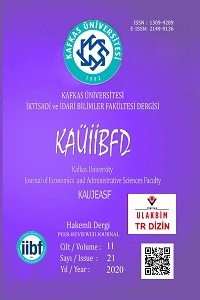Abstract
İşletmeler kendilerine maliyet yükü
getirecek nakliye, bilgi teknolojileri gibi faaliyetleri genel olarak bu
hizmetleri kendilerine sunabilecek düzeyde olan işletmelerden dış kaynak
kullanımı yolu ile kullanmaktadırlar. Bilgi teknolojileri, işletmelerin en çok
ihtiyacı olan bilginin işletme içerisine doğru hareketinde rol oynarken
işletmelerin iç haberleşmelerinde, bilgi aktarımlarında da rol oynamaktadır. Dolayısıyla
işletmelerin bilgi teknolojileri kullanım yetkinliğinin satın aldıkları
lojistik hizmeti satın alan işletmelerin performanslarını etkilemeleri
beklenmektedir. Bu çalışma, lojistik hizmeti satın alan KOBİ’lerde kullanılan
bilgi teknolojilerindeki yetkinliklerinin lojistik performans algıları üzerinde
etkisinin olup olmadığının ölçülmesini amaçlamaktadır. Sektör gözetilmeden yüz
yüze anket uygulaması yapılmış ve toplam 355 veri toplanmıştır. Veriler SPSS
25.0 istatistik paket programı uygulanarak, faktör analizi, t testi ve ANOVA
testleri uygulanmıştır. Çıkan sonuçlara göre, bilgi teknolojileri yetkinliği
ile lojistik performans arasında anlamlı bir ilişki olduğu tespit edilmiştir.
Ayrıca, bilgi yetkinliğinin işletmenin büyüklüğüne ve çalışan sayısına göre
farklılık gösterdiği fakat cinsiyete, eğitim durumuna, ve faaliyet yılına göre
bir farklılık göstermediği ortaya çıkmıştır.
References
- Aivaz, K. ve A. Capatina. 2013. “Implications of Logistic Service Quality on the Satisfaction Level and Retention Rate of an E-Commerce Retailer’s Customers.” http://www.ecocyb.ase.ro/20132/Micu%20Adrian%20(T).pdf
- Daugherty, P. J; Chen, H.; Mattioda D., ve Grawe, S. J. (2009). “Marketing/Logistics Relationships: Influence on Capabilities and Performance.” Journal of Business Logistics, 30(1): 1–18.
- Daugherty, P. J; Stank, T. P. ve Ellinger, A. E. (1998). “Leveraging Logistics/Distribution Capabilities: The Effect of Logistics Service on Market Share.” Journal of Business logistics, 19(2): 35.
- Ellinger, A. E., Daugherty, P. J., ve Keller, S. B. (2000). “The Relationship between Marketing/Logistics Interdepartmental Integration and Performance in US Manufacturing Firms: An Empirical Study.” Journal of Business Logistics 21(1): 1.
- Gil-Saura, I., ve Ruiz-Molina, M. E. (2011). “Logistics Service Quality and Buyer–customer Relationships: The Moderating Role of Technology in B2B and B2C Contexts.” The service industries journal 31(7): 1109–23.
- Gil Saura, I., Ruiz Molina, M. E., ve Frances, D. S. (2008). “Logistic Service Quality and Technology: A Comparison between Supplier–retailer and Retailer–consumer Relationships.” The International Review of Retail, Distribution and Consumer Research 18(5): 495–510.
- Gil Saura, I., Servera Frances, D., Berenguer Contri, G. ve Fuentes Blasco, M. (2008). “Logistics Service Quality: A New Way to Loyalty.” Industrial Management & Data Systems 108(5): 650–68.
- Lai, F., Zhao, X. ve Wang, Q. (2007). “Taxonomy of Information Technology Strategy and Its Impact on the Performance of Third-Party Logistics (3PL) in China.” International Journal of Production Research 45(10): 2195–2218.
- Mentzer, J. T, ve Williams, L. R. (2001). “The Role of Logistics Leverage in Marketing Strategy.” Journal of Marketing Channels 8(3–4): 29–47.
- Stank, T. P, Keller, S. B. ve Daugherty. P. J (2001). “Supply Chain Collaboration and Logistical Service Performance.” Journal of Business logistics 22(1): 29–48.
- Tippins, M. J., and Sohi, R. S. (2003). “IT Competency and Firm Performance: Is Organizational Learning a Missing Link?” Strategic Management Journal 24(8): 745–61.
Details
| Primary Language | Turkish |
|---|---|
| Journal Section | Articles |
| Authors | |
| Publication Date | June 30, 2020 |
| Acceptance Date | June 2, 2020 |
| Published in Issue | Year 2020 Volume: 11 Issue: 21 |
KAUJEASF is the corporate journal of Kafkas University, Faculty of Economics and Administrative Sciences Journal Publishing.
KAUJEASF has been included in Web of Science since 2022 and started to be indexed in the Emerging Sources Citation Index (ESCI ), a Clarivate product.

